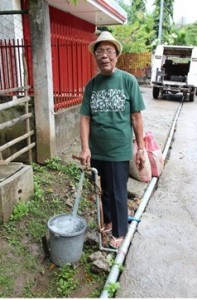
Seventy-two year-old Teodora Tan, known as Ka Doring, knew just how badly her community needed clean water. Residents in Barangay Matuyatuya in Torrijos, Marinduque had to pay PhP 35 for a drum of water, a price that the villagers who are steeped in poverty can ill afford. “Kagustuhan ko po talaga magkatubig ang barangay. Talaga pong mahirap iyon para sa aming mahihirap ,” she said, with tears in her eyes.
As such, when Kapit-Bisig Laban sa Kahirapan-Comprehensive and Integrated Delivery of Social Services (Kalahi-CIDSS) came to their village, she was one of the first who rushed to sign up to work for the project. “Naiyak ako nung nalaman kong na-approve iyong patubig project namin. Dali-dali akong nagpalista para tumulong ,” she recalled.
Kalahi-CIDSS is one of the core social protection programs of DSWD in combating poverty. It is a community-driven development (CDD) project that seeks to empower ordinary citizens to actively and directly participate in local governance by identifying their own community needs, planning, implementing, and monitoring projects together to address local poverty issues.
Grandmother’s wish
“Matagal naming hinangad na magkaroon ng patubig ang aming barangay, sa tulong ng proyektong ito ay may sarili na kaming pagkukunan ng malinis na tubig.” (Our community are longing for a good water source system, this project would provide us safe and potable water). She described how excited she was on her first day of work. “Nung gabi bago nung araw ng trabaho, hindi po talaga ako nakatulog. Alas-tres ng madaling-araw gising na po ako. Alas-singko papunta na po ako ng bundok .”
Still, her enthusiasm about the project was not widely shared by some of her fellow villagers. Some even have told her that she could not do it. “Ang sabi nila kay Ka Doring, ‘Anong alam niyang matanda na iyan? Katandaan na ni Ka Doring, parampa-rampa. Baka pa magkasakit.’ Masakit kasi parang minamaliit ako. Hindi naman po ako papasok diyan kung hindi ko alam ”, Ka Doring shared.
Even so, she was not prepared for the amount of work that she had to do, including shoveling and carrying rocks and sacks of sand and gravel, and that is not even counting the difficulty of having to trek up and down the mountain, where the water source is. It came to the point that she began doubting herself. “Matanda na ako. Kaya ko pa ba ito? She continued, “Isang linggo po kaming nagbubuhat doon sa bundok. Sumasakit na tuhod ko, tapos nung lumipat kami sa kabila ay napakadulas. ,” she added.
Still, her desire to give water to her community spurred her to endure working. “Ang inisip ko po talaga ay ang kapakanan ng bayan ,” she shared. In particular, she thought of her grandchildren, who stood to gain from the project. “Tama nga na matanda na ako, pawala na ako, pero paano iyong mga apo ko na puwedeng makinabang dito? Gusto ko pong masabi sa kanila na, ‘Apo, nagtiis ako para magkaroon ka ng tubig’ ,” she quipped.
She pushed herself, not heeding the aches and pains she collected while working. “Tatlong beses po ako nadulas, nalaglag, nahulog pagpunta doon sa project site, pero pinilit ko pa rin. .” It reached the point that she was able to shrug off the pain in order to work for what she wanted. “Parang hindi po ako napagod kahit na hindi na ako makalakad ,” she said, with a fulfilled look on her face.
Women Power
Ka Doring’s pep talks were not only for herself, but for her fellow volunteers, particularly the women. Even though she did not hold a leadership position in Kalahi-CIDSS, she rallied everyone to help in the project. She brought enough snacks to the project site to share with everyone in the team, and she carried face towels so they could wipe off their sweat. She carried over-the-counter medications to give to the other volunteers in case they got sick. She even bought lollipops to give as treats to those who are working in the project. “Iyong binibigay ko po iyong lollipop na tig-limang piso. Talagang nagtitipid po ako para makabigay sa kanila .” She added, laughing, “Ang mga tamad, walang lollipop .”
Those who lazed around in the work site were castigated by Ka Doring. “Nung naghahakot na kami, nakakita ako ng tatamad-tamad. Sabi ko, ‘Huwag kayong tatamad-tamad. Dali-dalian natin para tayo makatapos at makinabang tayo sa tubig na inaasam-asam natin’ .”
Her drive, passion, and enthusiasm for the project made her a source of inspiration and encouragement for the other volunteers, particularly for the women. “Si Ka Doring ang aming boses ,” said Nora Gamboa, 43, a member of the Kalahi-CIDSS procurement team for Matuyatuya who also engaged in paid labor in the water system sub-project. “Kahit itong matandang ito nadudulas na, kaya pa rin. Kaya kahit kaming babae ang nagsulong sa mabibigat na bato, minsan nagtutulong-tulong kami ,” Nora said, sharing that they got this from Ka Doring’s mantra, “Walang iwanan .” Ka Doring explained, “Paano kung wala sa kanila ang pumasok? Kaya sabi ko walang iwanan. Kahit na anong mangyari, ipagpatuloy natin ang gawain natin .” This inspired her fellow women volunteers to give the same amount of passion and dedication in their tasks. They even provided ways to make Ka Doring’s work easier, by allowing her to go home earlier than they so she did not have to go down the mountain in the dark.
Ka Doring’s reasoning for inspiring women is simple: “Sa akin po kung ano kaya ng lalaki, kaya rin ng babae, basta pangatawanan .” She emphasized, saying, “Ang masasabi ko lang sa mga gustong tumulong, subukan lang nila. Tingnan niyo nga ako, matanda na, pero nakaya ko pa .” ###


